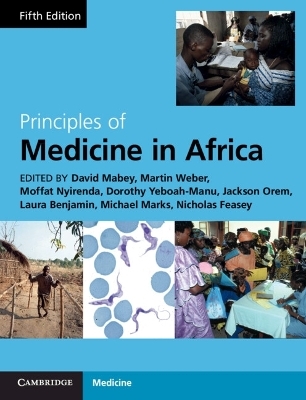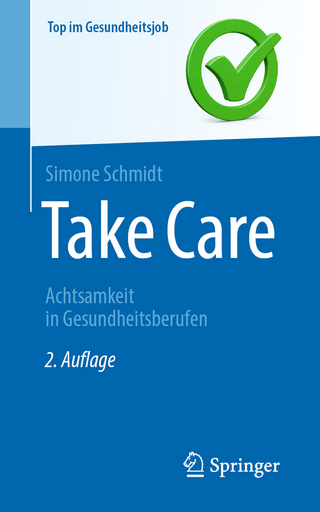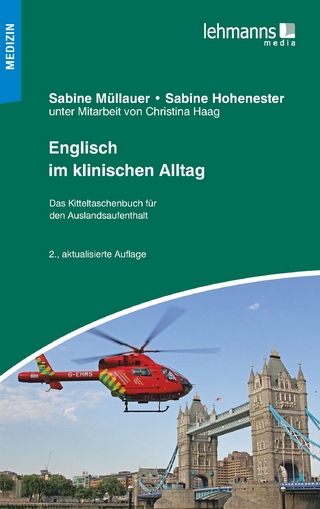
Principles of Medicine in Africa
Cambridge University Press (Verlag)
978-1-316-51143-5 (ISBN)
- Noch nicht erschienen (ca. Mai 2025)
- Versandkostenfrei
- Auch auf Rechnung
- Artikel merken
Principles of Medicine in Africa combines clinical medicine with a rich understanding of the major environmental and cultural influences on health and disease, providing comprehensive guidance for anyone intending to practise medicine in Africa. Presenting disease in the context of family and culture, the effects of inequality and problems of limited resources are addressed. The authors have a wealth of experience in front line healthcare in Africa and provide practical, evidence-based management guidelines for all the common and less common conditions likely to be encountered. This fifth edition has been thoroughly updated to incorporate the latest research findings and management guidelines and there has been much greater involvement of African physicians in the writing and editorial process. The chapters on cancer and non-communicable diseases have been expanded and new chapters have been added on digital health, critical care in a resource-limited setting, antimicrobial resistance, COVID-19 and other emerging infectious diseases.
David Mabey is a physician specialising in Infectious and Tropical Diseases. He worked as a clinician in The Gambia for eight years before joining LSHTM, where he was head of the Clinical Research Department, Director of the Wellcome Trust Bloomsbury Centre for Clinical Tropical Medicine and Director of the WHO Collaborating centre for the Prevention and Control of Sexually Transmitted Infections. He chairs the Scientific and Technical Advisory Group of the WHO Department of Neglected Tropical Diseases and is a former president of the Royal Society of Tropical Medicine & Hygiene. Martin W. Weber is Team lead for Quality of Care, WHO Regional Office for Europe. He is a paediatrician who has been working for WHO for over twenty years in different continents, improving the care for mothers and children. He spent six years at the MRC labs in the Gambia where he was involved in the development and testing of clinical algorithms for newborn babies and children which became widely used as IMCI. He led the development of the Pocket book of children, a standard for clinical management in small hospitals widely translated and used for quality improvement in hospitals. Moffat Nyirenda is a Diabetologist/Endocrinologist and Professor of Medicine (Global Non-Communicable Diseases) at the London School of Hygiene and Tropical Medicine (LSHTM), and leads the non-communicable disease research theme at MRC/UVRI and LSHTM Uganda Research Unit. He was among the first graduates from the College of Medicine in Malawi, with “hybrid” training between University College London and University of Malawi. He subsequently trained and worked at the University of Edinburgh, supported by a prestigious MRC Clinician Scientist Fellowship. Before taking up his current position at LSHTM in August 2013, he was Professor of Research at Malawi College of Medicine and Associate Director of Malawi-Liverpool-Wellcome Trust Clinical Research Programme. He is on the International Advisory Board for Davidson's principles and Practice of Medicine. Dorothy Yeboah-Manu is a Professor of Microbiology and the Director, Noguchi Memorial Institute for Medical Research, University of Ghana. A major focus of her research is on tuberculosis and Buruli ulcer. She is a member of several local and international committees including the chairperson of the Advisory Board of the National Tuberculosis Program and the Vice President of the Immunological Society of Ghana. Dorothy Received the Royal Society Africa Prize in 2018 and a Senior Fellow of the EDCTP. Jackson Orem is a medical oncologist and Executive Director of the Uganda Cancer Institute (UCI), a teaching and research institute of the Government of Uganda affiliated with Makerere University. He is currently spearheading the operationalization of the East Africa Centre of Excellence in Oncology (EACOE) at the Uganda Cancer Institute with the mandate of providing specialized cancer care research and training for the entire East Africa region under the East African Community (EAC) countries. He is also the alternate chair for African Cancer Coalition an initiative to improve management of cancer by harmonization of treatment practices in Sub-Saharan Africa. Laura Benjamin is a Principal Research Fellow of Neurology at University College London and Honorary Consultant in Neurology at the National Hospital for Neurology and Neurosurgery, University College London Hospital. She has worked and lectured in East/Southern Africa with a particular focus on Neurological infection and stroke. Michael Marks is an Associate Professor of Infectious Diseases at LSHTM and Honorary Consultant in Infectious Diseases at the Hospital for Tropical Diseases, University College London Hospital. He has worked in both the Pacific and West Africa with a particular focus on neglected tropical diseases and sexually transmitted infections. Nicholas A. Feasey is an Infectious Diseases physician and Professor of Clinical Microbiology at the Liverpool School of Tropical Medicine. He is based at the Malawi Liverpool Wellcome Research Programme, part of the Kamuzu University of Health Sciences in Blantyre, Malawi. His research is focused on the surveillance and management of antimicrobial resistant bacterial infection, and taking a one health approach to exploring the transmission of enteric pathogens associated with invasive disease, and he is a senior physician at Queen Elizabeth Central Hospital, Blantyre.
Part I. Health and Disease: 1. People and the environment; 2. Food and nutrition; 3. Humanitarian crises and forced displacement; 4. Managing a health service with management and financing of drug supply; 5. Digital health; 6. Critical care medicine; Part II. Mother and Child Health: 7. The pregnant patient; 8. Neonatal care; 9. The integrated management of childhood illness (IMCI); 10. Severe acute malnutrition in childhood; 11. Diarrhoea; 12. Pneumonia and other acute lower respiratory tract infections in children; 13. Measles; 14. Pertussis; Part III. Infection: General Principles: 15. Immune response to infections; 16. Approach to the febrile adult patient; 17. Management of Sepsis; 18. Infection prevention and control; 19. Outbreaks and epidemics; Part IV. Major Common Infections: 20. Malaria; 21. HIV/AIDS; 22. Tuberculosis; 23. Pneumonia in adults; 24. Meningitis; 25. Sexually transmitted infections; Part V. Bacterial Infections: 26. Typhoid, paratyphoid and non-typhoid Salmonella infections; 27. Streptococcus pyogenes and Staphylococcus aureus; 28. Rickettsioses and other rickettsial disease; 29. Brucellosis; 30. Leptospirosis; 31. Relapsing fever; 32. Plague; 33. Anthrax; 34. Tetanus; 35. Diptheria; 36. Leprosy; 37. Mycobacterium ulcerans Disease (Buruli ulcer); 38. Cholera; 39. Antimicrobial resistance; Part VI. Viral Infections: 40. Viral haemorrhagic fevers: lassa fever, rift valley fever, ebola/marburg fever and crimean–congo fever; 41. Yellow fever; 42. Hepatitis; 43. Dengue; 44. Rabies; 45. Influenza; 46. Poliomyelitis; 47. Varicella (chickenpox), herpes zoster and monkeypox; 48. Rubella; 49. Mumps; 50. Covid-19; Part VII. Protozoal Infections: 51. Leishmaniasis; 52. Human African trypanosomiasis; 53. Amoebiasis; 54. Intestinal protozoa; Part VIII. Helminth Infections: 55. Intestinal helminths; 56. Schistosomiasis; 57. Lymphatic filariasis and loa loa; 58. Onchocerciasis; 59. Cysticercosis and neurocysticercosis; 60. Hydatid disease; 61. Paragonimiasis; 62. Trichinellosis; 63. Guinea Worm; Part IX. Fungal Infections: 64. Fungal infections; Part X. Non-Communicable Diseases: 65. Chronic and non-communicable disease in Africa; 66. Diabetes mellitus; 67. Hypertension; 68. Stroke; 69. Epilepsy; 70. Mental health: depression, post-traumatic stress disorder, substance misuse and stigma; 71. Chronic respiratory diseases: asthma, chronic obstructive pulmonary disease, post-tuberculosis lung disease, bronchiectasis and HIV lung disease; 72. The disabled patient; Part XI. Diseases of Body Systems: 73. The heart; 74. The lung; 75. Blood disorders; 76. The gut; 77. The liver; 78. The kidney and body fluids; 79. Bones and joints; 80. Endocrinology; 81. The nervous system; 82. The skin; 83. The eye; 84. Ear, Nose and Throat (ENT); Part XII. Cancer and Palliative Care: 85. Approach to cancer care, the key role of palliative Medicine; 86. Approach to palliative care in cancer patients; 87. Common solid malignancies; 88. Common hematological malignancies; 89. Common childhood cancers; 90. Cancers in the HIV infected; Part XIII. Venoms and Poisons: 91. Venomous and other dangerous animals; 92. Poisoning.
| Erscheint lt. Verlag | 31.5.2025 |
|---|---|
| Zusatzinfo | Worked examples or Exercises |
| Verlagsort | Cambridge |
| Sprache | englisch |
| Themenwelt | Medizin / Pharmazie ► Allgemeines / Lexika |
| ISBN-10 | 1-316-51143-X / 131651143X |
| ISBN-13 | 978-1-316-51143-5 / 9781316511435 |
| Zustand | Neuware |
| Haben Sie eine Frage zum Produkt? |
aus dem Bereich


